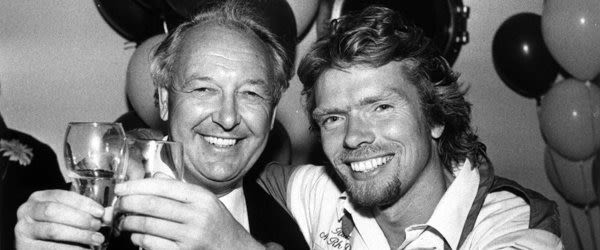Five business leaders who have a mentor to thank for their success
The connection between a mentor and a mentee can be the most powerful relationship in business, with so many of the world’s most prominent leaders going on record to thank a mentor for part of their success. Even Richard Branson cites the importance of mentor Sir Freddie Laker in helping him get Virgin Atlantic off the ground.
Here we take a look at some of the most effective mentors in the history of business and assess the impact they were able to have.
Mike Markkula & Steve Jobs
A relatively unknown name in the emergence and development of Apple, Mike Markkula was an angel investor in the company in its infancy, and helped to oversee the development and release of the first products off their shelf.
A few years down the line two young whippersnappers named Steve Wozniak and Steve Jobs were brought on board to engineer the so-called Apple II computer, and Markkula took an instant liking to the youthful exuberance of the pair.
In a relationship in which Jobs would call the senior partner in the company the 'adult supervisor', Markkula was the overseer that kept the brand’s vision on track and invested the princely sum of $250,000 to ensure the Apple II project saw the light of day. The rest, as they say, is history.
In a plot twist not unbecoming of a Hollywood movie, it was Markkula who is claimed to have been a figurehead in the sacking of Jobs in 1975, although he is thought to have been supportive of the future CEO’s return to the company a decade later.
In his biography, Jobs wrote of Markkula: "Mike really took me under his wing. His values were much aligned with mine. He emphasised that you should never start a company with the goal of getting rich. Your goal should be making something you believe in and making a company that will last."
Wozniak was also quoted as saying that Markkula "was actually the one man and one person who made Apple a successful company".
Steve Jobs & Mark Zuckerberg
When looking at examples of mentor-mentee relationships and key interactions that lay the foundations for some of the modern world’s most important moments, Steve Jobs telling Mark Zuckerberg to visit India might not seem all that relevant.
But it was this titbit of dialogue – specifically Jobs suggested Zuckerberg visit the same Kainchi Dham temple as he did in the early gestation period of Apple - that ultimately led to the advancement of Facebook as the world’s most popular communication channel.
"Early on in our history when things weren't really going well," Zuckerberg said. "We had hit a tough patch and a lot of people wanted to buy Facebook."
"I went and I met with Steve [Jobs], and he said that to reconnect with what I believed was the mission of the company, I should go visit this temple in India that he had gone to early in the evolution of Apple, when he was thinking about what he wanted his vision of the future to be."
That trip of enlightenment emboldened his vision of the company, and would ultimately cement the ideas and ideals that would inform the rise and rise of Facebook.
Eric Schmidt & Larry Page/Sergey Brin
When Larry Page and Sergey Brin founded Google, they clearly had no idea how quickly the company would grow in the face of the rapid ascent of their search engine as the world’s favourite finder of things online.
The pair were computer scientists, rather than businessmen, and clearly needed an overseer to manage the corporate requirements of the multi-million pound organisation. In came Eric Schmidt, formerly of Sun Microsystems and Novell, who impressed Page and Brin with his open-minded outlook.
"Larry and I searched for over a year, and managed to alienate 50 of the top executives in Silicon Valley. Eric was experienced and the only one who went to Burning Man. Which we thought was an important criterion. He's a great cultural fit. We hang out together. We discuss and decide on stuff together. More companies should look at cultural fit,” Brin recalled.
Schmidt’s experiences elsewhere enabled him to develop the corporate infrastructure - in combination with Page and Brin’s technical knowhow - to manage Google’s growth effectively; a perfect example of the mentoring relationship and how knowledge gaps can be overcome.
Warren Buffet & Bill Gates
Having dropped out of Harvard as a teenager, it was touch and go as to whether Bill Gates would be able to get his ideas of the ground.
But a profound belief in his abilities - plus the assistance of mentor, investor and benefactor Warren Buffet - ensured that Microsoft, then a fledgling partnership between Gates and Paul Allen, had the infrastructure in place to succeed.
The impact of Buffet’s experience and input on Gates was clear from the interview the pair conducted with CNBC, in which the Microsoft founder credited Buffet for his invaluable advice in overcoming adversity and long-term thinking. His ability to "teach things that are complex and put them in a simple form, so that people can understand and get the benefit of all his experience", enabled Gates to fulfil his potential and make a mockery of his 'high school dropout' tag.
Billy Salomon & Michael Bloomberg
As is often the case, billionaire Michael Bloomberg came from rather more humble beginnings than the wealth he has gone on to accumulate, and he too had a mentor to thank for instilling in him the values and principles that would lead to such a successful career.
Fresh out of education, Bloomberg applied for a job as a trader at Salomon Brothers & Hutzler. At his interview he bumped into a kindly man who stopped for a chat to offer some pearls of wisdom. The man was William R. Salomon, the company’s founder and somebody who Bloomberg would latterly credit for much of his success.
He got the job, and started a journey that would see him become the eighth wealthiest person on the planet and serve three terms as the Mayor of New York.
Speaking at Salomon’s memorial service in 2014, Bloomberg stated that he "didn’t teach by lecturing. He taught by leading, and he led by example. On most mornings, he’d be the first one in the office. He was a good listener, but he didn’t manage by consensus. He was his own man, he made his own decisions, and he didn’t look back."
"He was as respectful to the guy who cleaned the bathrooms as he was to the senior partners. More so, in fact."
This is a guest blog and may not represent the views of Virgin.com. Please see virgin.com/terms for more details.

